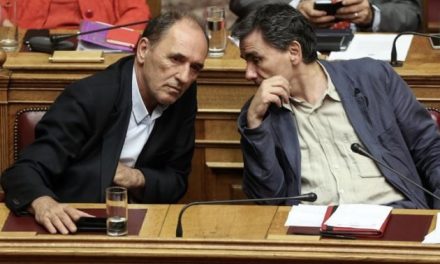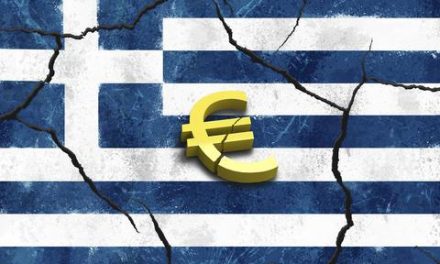By Holly Ellyatt, CNBC
Greece is starting to run out of money and a lack of concrete action on reforms could see the country kicked out of the euro zone, analysts warned.
Athens is expected to present a package of reforms to its euro zone creditors by Monday, in an effort to unlocking vital financial aid and avoiding a potential default — but some doubt the proposals will come.
The country risks running out of cash by April 20 unless it secures fresh aid, a source familiar with the matter told Reuters Tuesday, leaving it with little time to convince its skeptical European partners that it is committed to economic reform.
As a result, analysts warned that Greece could delay no longer and had no room for maneuver.
“Another ‘kick of the can down the road’ is not possible,” Athanios Vamvakidis, head of European G10 foreign exchange strategy at Bank of America Merrill Lynch, said in a note Wednesday.
“Greece would be forced to exit the euro without reforms,” he added, saying it was the “end of the road” for Greece and its euro zone neighbors.
Greece’s new left-wing government has struggled to impress its international creditors since it came to power in January. The country has received 240 billion euros ($262 billion) in aid as part of two financial bailouts since 2010, but it still has the highest unemployment rate in Europe, at 25.7 percent, and the highest debt pile, which is around 175 percent of gross domestic product (GDP).
In February, Greece was given a four-month extension to its bailout program, but it has yet to convince the bodies overseeing its bailout – comprising the European Central Bank, European Commission and International Monetary Fund (IMF) — that it is serious about reforms.
Vamvakidis outlined three possible scenarios for Greece, with the best being a commitment to reforms, leading to positive growth surprises.
The “bad” and “ugly” alternatives were more worrying, he said. The former would see Greece doing just enough to stay in euro zone, whereas the latter scenario — in which there is no deal between Greece and its creditors — “leads to a bank run, capital controls, and eventually Euro exit.”
“It could also be the case that triggering the bad, or even the ugly scenario would force a political consensus in Greece to move to the good scenario, but the situation will likely have deteriorated substantially in the meantime,” he said.
Running out of cash
In the meantime, Athens has some serious bills to pay.
On April 9, it has to make a 450 million euro ($500 million) repayment to the IMF. It also has a 1.7 billion bill for wages and pensions in Greece, according to the Financial Times, which said the government was “raiding public health coffers” in a desperate hunt for cash.
Greek government and euro zone officials believe Athens does not have funds to cover both repayments, the FT said.
Mujtaba Rahman, Europe practice head at the Eurasia Group, was sceptical that Greece’s reforms proposals would be presented by Monday, saying that only as the next IMF loan repayment loomed, would Greece be forced to act.
“We only believe a deal is likely closer to the 9 April IMF repayment, as a growing sense of crisis is critical for Greek Prime Minister Alexis Tsipras’s ability to manage his domestic constraints and legislate reforms through parliament,” Rahman said in a note Wednesday.
“Faced with the potential for IMF non-repayment, increased deposit flight and generalized market stress, an ad-hoc extraordinary (and what would likely end up being a marathon) Eurogroup (of euro zone finance ministers) could be called,” he said.
Rahman argued that only then would Greece put together a reform list, which would be pushed through parliament, “potentially even using a number of emergency decrees. Funding would then follow.”



















